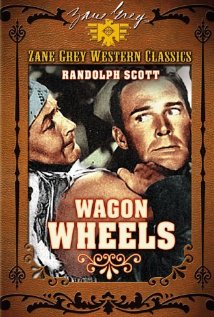
WAGON WHEELS
US, 1934, 59 minutes, Black and white.
Randolph Scott, Gail Patrick, Billy Lee, Monte Blue, Raymond Hatton.
Directed by Charles Barton.
Wagon Wheels is a brief western from the early 1930s, based on Zane Gray novel. It is a brief picture of migrants leaving Independence, Missouri, on their way to Oregon in 1844. The film captures the atmosphere of many similar treks in the 1840s and 1850s.
There are some effective sequences of the wagons, the trek, the focus on the wheels, the threats from attacking Indians, the friendship between the travellers. Randolph Scott, who was beginning to star in brief westerns at this time (and also to move into musicals with Fred Astaire and Ginger Rogers, Follow the Fleet) is one of the scouts leading the group. He has some action sequences, especially fighting one of the travellers who is part Indian and is in league with Indian tribes urging attacks on the travellers to prevent them getting through.
Gail Patrick is a widow with a young son whom she abducts from her husband’s family, is criticised by Scott for travelling but buys another wagon and becomes part of the group. The little boy, Billy Lee, is rather precocious – even with his sling firing at the Indians.
There are some grizzled travellers and guides, two sisters, one pioneer who is actually killed by the Indians, the other with her head in a book and writing the history of the trek, found attractive by one of the guides – with some happy prospects at the end.
There are quite a few songs throughout the film, including Wagon Wheels, an indication of how the travellers entertained themselves during the long route.
The film offers a tribute to the pioneers of the period – its presentation of the Indians is more traditional, their being presented as conniving, ferocious, and their deaths something to be welcomed.
Zane Grey was very popular in novels and films of this period. Charles Barton directed a number of short films from the 30s into the 50s and then into television, including Mark and Pa Kettle.